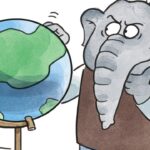In a recent article, UN Secretary-General Antonio Guterres criticized the IMF for unfairly favoring rich countries over poor ones, calling for radical reform of the IMF and the World Bank, the Associated Press (AP) reported.
His comments, which the AP described on Saturday as “an unusual move,” in effect echoed the growing doubts about the effectiveness of the IMF and the World Bank in promoting economic growth and stability of developing countries.
While they were originally established to support global economic stability and development, it is undeniable that more and more economists have become increasingly critical of the two financial institutions that have long been under the control of the US-led West and operated to benefit Westerns countries much more than less developed countries.
For instance, during the pandemic, the wealthy Group of Seven nations, with a population of 772 million, received the equivalent of $280 billion from the IMF while the least developed countries, with a population of 1.1 billion, were allocated just over $8 billion, the AP report said.
What’s more, the US has brought its geopolitical confrontation and zero-sum game mindset to these financial institutions for its own interests. Last week, US Treasury Secretary Janet Yellen said that the IMF and World Bank are American-aligned counterweights to China’s growing influence in the developing world as she seeks to garner congressional support for US financial backing of those lenders, according to Bloomberg. Yellen also said she doesn’t think China should qualify for World Bank loans.
Her rhetoric that praised the two international multilateral financial institutions as reflecting “American values” may be exactly why there have been growing concerns that these institutions are being hijacked by the US in recent years.
There are many signs that the US intends to use the IMF and the World Bank to counter China’s influence as part of its containment efforts, which have in fact undermined their credibility and influence. But that doesn’t necessarily mean the multilateral financial institutions should completely serve the US geopolitical strategy.
Chinese Foreign Ministry Spokesperson Wang Wenbin said at a recent press conference that “The IMF and the World Bank are multilateral financial institutions and platforms that reflect the trend toward greater democracy in international relations and advance international cooperation on the basis of fully taking into account the interests of all member states.” The IMF is not the International Monetary Fund of the US, neither is the World Bank for that matter. China has always carried out investment and financing cooperation with developing countries in keeping with international rules and the principle of openness and transparency.
However, unlike China’s practices in helping developing countries and relieving their debt pressure with no attached political terms, some Western institutions have been accused of pressuring countries to adopt pro-Western policies and to isolate countries that are not aligned with US interests in exchange for loans.
Moreover, the US often uses its veto power to block reforms that would give more voice and representation to developing countries in some multilateral financial institutions. This has led to a growing sense of frustration among these countries, who feel that their voices are not being heard in these institutions.
To a certain extent, some multilateral financial institutions have become increasingly unable to meet the needs of the international community for further development, therefore urgency of reforms to strengthen the representation of developing countries in these multilateral platforms has increased.
(Global Times)




